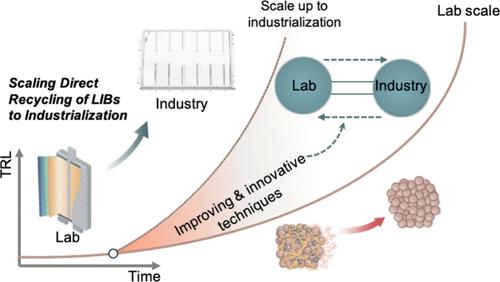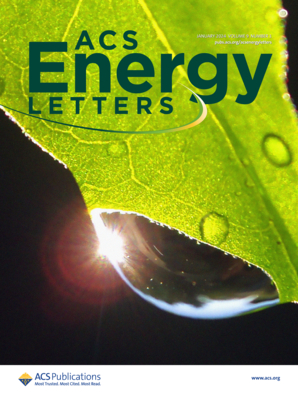Scaling Direct Recycling of Lithium-Ion Batteries toward Industrialization: Challenges and Opportunities
IF 19.3
1区 材料科学
Q1 CHEMISTRY, PHYSICAL
引用次数: 0
Abstract
Lithium-ion batteries (LIBs) are indispensable for modern technology, yet their limited lifespan contributes substantially to electronic waste. Effective recycling methods are crucial to mitigating material scarcity, enhancing sustainability, and fostering a circular economy. This perspective examines the current LIB recycling processes, with a focus on the emerging potential and challenges of direct recycling methods. Unlike traditional pyrometallurgy and hydrometallurgy, which often destroy valuable materials, direct recycling seeks to recover and restore functional components, preserving the integrity of active materials. However, this method faces significant technical hurdles, particularly due to the complex design of LIBs and the degradation of key components over time. This perspective explores the intricacies of battery structure and component degradation, examines the challenges of scaling up direct recycling for industry applications, and proposes future directions to improve the efficiency and viability of this sustainable recycling approach.

求助全文
约1分钟内获得全文
求助全文
来源期刊

ACS Energy Letters
Energy-Renewable Energy, Sustainability and the Environment
CiteScore
31.20
自引率
5.00%
发文量
469
审稿时长
1 months
期刊介绍:
ACS Energy Letters is a monthly journal that publishes papers reporting new scientific advances in energy research. The journal focuses on topics that are of interest to scientists working in the fundamental and applied sciences. Rapid publication is a central criterion for acceptance, and the journal is known for its quick publication times, with an average of 4-6 weeks from submission to web publication in As Soon As Publishable format.
ACS Energy Letters is ranked as the number one journal in the Web of Science Electrochemistry category. It also ranks within the top 10 journals for Physical Chemistry, Energy & Fuels, and Nanoscience & Nanotechnology.
The journal offers several types of articles, including Letters, Energy Express, Perspectives, Reviews, Editorials, Viewpoints and Energy Focus. Additionally, authors have the option to submit videos that summarize or support the information presented in a Perspective or Review article, which can be highlighted on the journal's website. ACS Energy Letters is abstracted and indexed in Chemical Abstracts Service/SciFinder, EBSCO-summon, PubMed, Web of Science, Scopus and Portico.
 求助内容:
求助内容: 应助结果提醒方式:
应助结果提醒方式:


